MercoPress. South Atlantic News Agency
Tag: Revolutionary Armed Forces of Colombia (FARC)
-
Wednesday, July 26th 2017 - 05:02 UTC
Colombia's FARC will officially become a political party on September first
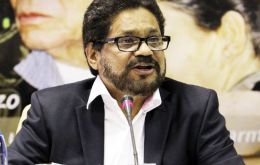
Colombia's FARC rebels will officially transform into a political party on September 1, a major step in reintegrating the former guerillas into civilian life as part of a historic peace deal.
-
Tuesday, July 11th 2017 - 07:22 UTC
Colombian president grants amnesty to FARC 3.600 members, as part of the peace deal
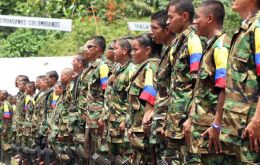
Colombia's President Juan Manuel Santos has signed a decree granting amnesty to another 3,600 members of the Farc rebel group, which last year reached a peace deal with the government. It is the third and final amnesty decree signed by Santos.
-
Wednesday, June 28th 2017 - 02:01 UTC
UN says FARC rebels hand over weapons to Colombian authorities
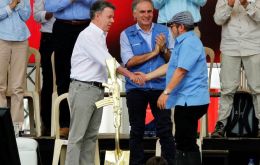
Leftist rebels in Colombia have turned over almost all of their fighters’ individual weapons as part of a historic peace deal reached with the government last year to end a half century of conflict, the United Nations said Monday.
-
Monday, January 30th 2017 - 15:51 UTC
FARC member accused of carrying out 300 abortions extradited from Spain to Colombia
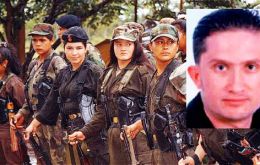
Spain has agreed to extradite to Colombia a former FARC rebel accused of carrying out 300 forced abortions on women fighters, some of them underage. Hector Arboleda Albeidis Buitrago, who has Spanish nationality, was detained in Madrid in December 2015.
-
Thursday, December 15th 2016 - 08:28 UTC
Colombia's FARC expels five commanders who rejected demobilization; fears they will turn to criminal gangs
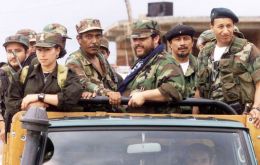
Colombia's FARC rebels have expelled five commanders for refusing to demobilize and join a peace process with the government aimed at ending more than five decades of war, guerrilla leadership said. The five commanders, all from units in the country's southeast jungle, include one former participant in four-year-long peace talks in Cuba.
-
Thursday, November 24th 2016 - 15:13 UTC
Santos and FARC sign new peace agreement; new version submitted for a vote in Congress

Colombia's government and FARC guerrillas will sign a new peace accord on Thursday, after a previous agreement to end their half-century-old war was defeated in a referendum, both parties said. The new, revised accord will be submitted to Congress for approval, rather than put to another referendum, they added.
-
Monday, November 14th 2016 - 08:43 UTC
Colombia and FARC announce modified peace accord
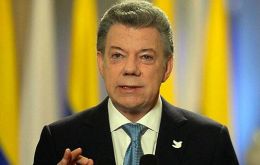
Colombia's government and its largest rebel group announced a new, modified peace accord Saturday, after voters rejected an earlier deal in a referendum. The government and Revolutionary Armed Forces of Colombia (FARC) - a Marxist guerrilla group - said in a joint statement they had incorporated proposals from various groups in the new deal.
-
Wednesday, November 2nd 2016 - 10:48 UTC
Santos state visit to UK highlights Britain's involvement in the Colombian conflict and peace process
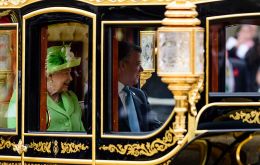
Tuesday saw the first ever state visit by a Colombian president to the UK. Nobel Peace Prize laureate, President Juan Manuel Santos is visiting for three days as an official guest of Her Majesty The Queen and the Duke of Edinburgh. He will have a working lunch with Prime Minister Theresa May, visit Belfast and attend events at Mansion House, the Natural History Museum and his old university, the LSE.
-
Monday, October 17th 2016 - 09:57 UTC
“Spoiler” Uribe replies to the NYT editorial: “an offence to the millions of Colombians who voted NO”

Colombia's Democratic Center party founded by former president Alvaro Uribe criticized on Sunday The New York Times for a recent editorial accusing the ex head of government of “blocking” the peace process in the country and calling on him to act as “a true statesman”. The party said that the NYT editorial constitutes “an offence to the millions of Colombians” who voted against the terms of the peace accord between the government and the main guerrilla group, FARC.
-
Thursday, October 6th 2016 - 11:50 UTC
Uribe demands overhaul of a “weak” deal; peace talks resume in Havana
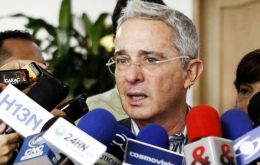
Colombian President Juan Manuel Santos said Wednesday peace with the FARC rebels is “close,” but his top opponent demanded an overhaul of a “weak” deal rejected by voters in a referendum.
